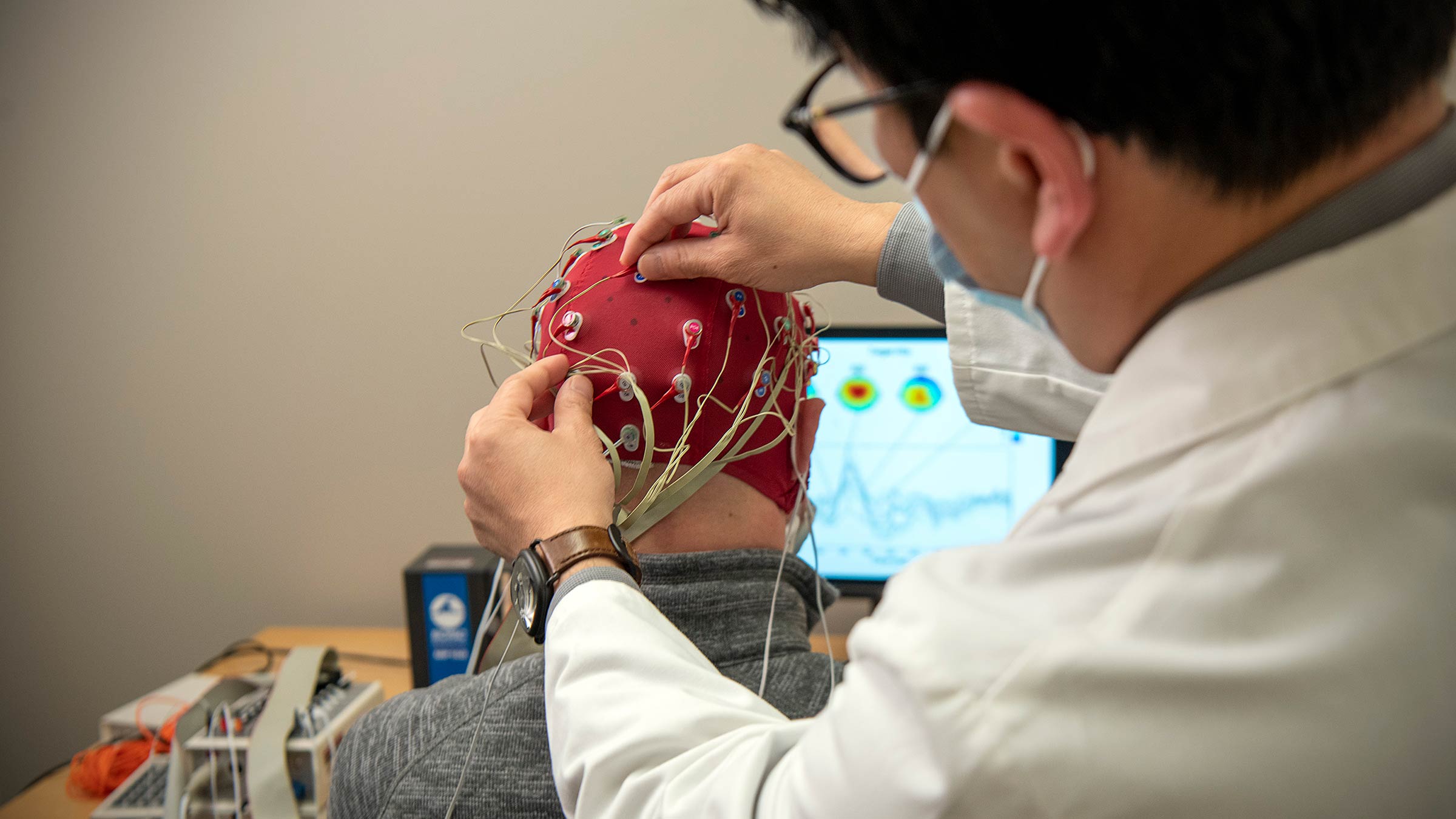$20 million research project tackles mental health epidemic on massive scale
Study will look at roots of mental illness and new approaches to treatment in all 88 Ohio counties
In the midst of the COVID-19 pandemic, Ohio State psychiatrist K. Luan Phan, MD, had the opportunity to talk with Ohio Gov. Mike DeWine about new ideas and strategies on how we would tackle the challenges that face Ohioans and that keep them from living to their fullest potential. It was an important conversation as the stressors of the pandemic were straining Americans’ mental health.
They also discussed another alarming crisis in the country, one hitting the state of Ohio especially hard: Every day, on average, 427 Americans, 19 in the state of Ohio alone, were dying from drug overdose and suicide.
Gov. DeWine was already aware at the time that The Ohio State University Wexner Medical Center had many previous successes creating prevention efforts to treat people before they got sick. So, he asked Dr. Phan, professor and Jeffrey Schottenstein Chair of Psychiatry and Resilience at The Ohio State College of Medicine, what they were going to do, together, about the growing mental health epidemic.

His response: Take a prevention approach and bring science to the people so we can determine what works to reduce risk and helps build resilience when hardship strikes. Dr. Phan noted that the present strategy in clinical settings, albeit critical, has focused on reactive approaches to crises and that we have yet to make a real effort at going upstream to think about how we can intervene earlier in the course of mental illness and even prevent it in the first place.
“We have to find out what are the key factors that lead to mental illness and what are the key factors that protect from illness in the face of stress, trauma and adversity. We need to know who gets sick, why they get sick, how they get sick, when they get sick,” Dr. Phan said. “We need to develop a broad and deep strategy to more comprehensively study people — their biology, their brain, their psychology, their social world — in families across generations and over time. Only then can we get to root causes and modify them.”
Understanding mental illness at its root
With experience as an international leader in neuroscience, psychiatry and resilience, Dr. Phan quickly assembled a team to lead the new $20 million State of Ohio Adversity and Resilience (SOAR) Study.
This unique research initiative pairs Ohio State clinicians and researchers with several Ohio public universities, academic medical centers and community organizations to identify the root causes of the ongoing epidemic of persistent emotional distress, suicide and drug overdose.
“We’re bringing together and connecting the world’s best minds to solve the mind’s toughest problems,” Dr. Phan says.
The Ohio Department of Mental Health and Addiction Services is providing the initial SOAR Study funding to launch the first-in-the-nation research project that will span the entire state of Ohio to develop a new playbook on how to translate discovery of risk and resilience factors into prevention strategies, better treatments and cures for mental health.

The SOAR Study will examine biological, psychological and social factors across multiple generations. These domains have been studied separately, in individuals and at a single point in time. This siloed approach has slowed progress.
Within the department of Psychiatry and Behavioral Health alongside Dr. Phan, the SOAR Study is led by Scott Langenecker, PhD, professor and vice chair of research, Nina Kraguljac, MD, professor, and Anthony (Tony) King, PhD, associate professor.
A comprehensive study of mental health in scope, scale and depth
The SOAR Study has launched two parallel but connected projects to investigate biological, psychological and social factors that may lead to mental illness and those that protect against mental illness.
Focusing on breadth, the SOAR Wellness Discovery Survey, will engage as many as 15,000 people across all 88 Ohio counties and help researchers understand the current state of mental health across the state in a diverse population. It focuses on uncovering not only risk factors, but also strengths and skills to help overcome stress and adversity. Understanding those links will inform researchers about which factors can be modified and to develop new treatments to target those factors.
Focusing on depth, the SOAR Brain Health Study, will study as many as 3,600 Ohioans from 1,200 families to examine the biological (brain function, genetics, biomarkers), psychological (cognitive function, coping styles, stress sensitivity) and social (social support, group affiliation, neighborhood environment) factors that underlie persistent distress, mental illness and substance use disorders, and that convey risk for drug overdose and suicide.
The study will also closely examine relevant life experiences such as childhood adversity, trauma, economic hardship/poverty and family history. It focuses on uncovering the root factors that lead to poor mental health, and how these factors may interact with one another.
Taking advantage of a ‘cross-section’ of America
Many of these families will visit five academic medical center sites near major cities (Columbus, Cincinnati, Cleveland and Toledo) to participate. One unique and innovative feature of the SOAR Brain Health Study is that it seeks to “bring science to the people” by sending mobile medical units to rural parts of Ohio to reach those farther away.
One intriguing benefit of this work is that Ohio is a demographic, geographic and economic cross-section of the country, including rural to urban, farmland to Appalachia, and diverse cultural and racial backgrounds for study. The information gained from the SOAR Study represents diverse communities. Lessons learned here in this microcosm of the United States can be translated in meaningful ways to communities across the country.

“We know that illness often runs in families and in certain communities. Therefore, we cannot study an individual alone and in the laboratory. We need to understand that person in the context of their history, their family, their neighborhood in order to ‘break the chain’ of mental illness,” Dr. Phan says.
The end goal: a roadmap to improve mental health and save lives
Studying families across multiple generations may lead to new strategies to reduce risk for mental illness and substance use disorders. Also, it may lead to new strategies to build resilience so that Ohioans can bounce back, adapt and even thrive after stress, trauma or adversity so that they can live to their fullest potential.
“The long-term mission is to move toward and prioritize prevention, which has not been emphasized when it comes to treating mental illness. In doing so, the SOAR Study will eventually offer a new roadmap for developing better treatments and cures that will improve and save lives,” Dr. Phan says. “This work is also an opportunity for us to empower Ohioans to learn about different pathways to cultivate resilience, and to better advocate for preventative care in our communities.”







